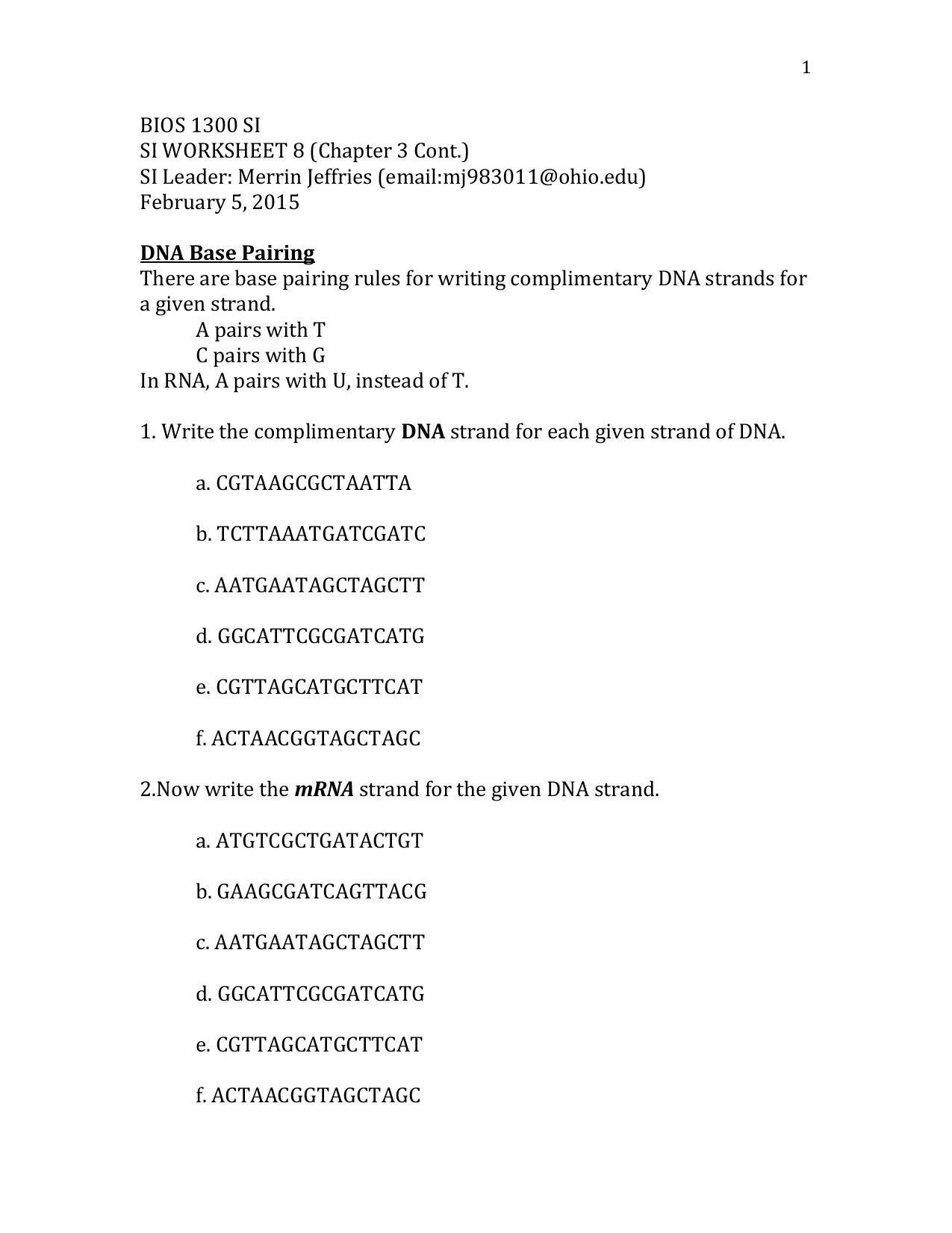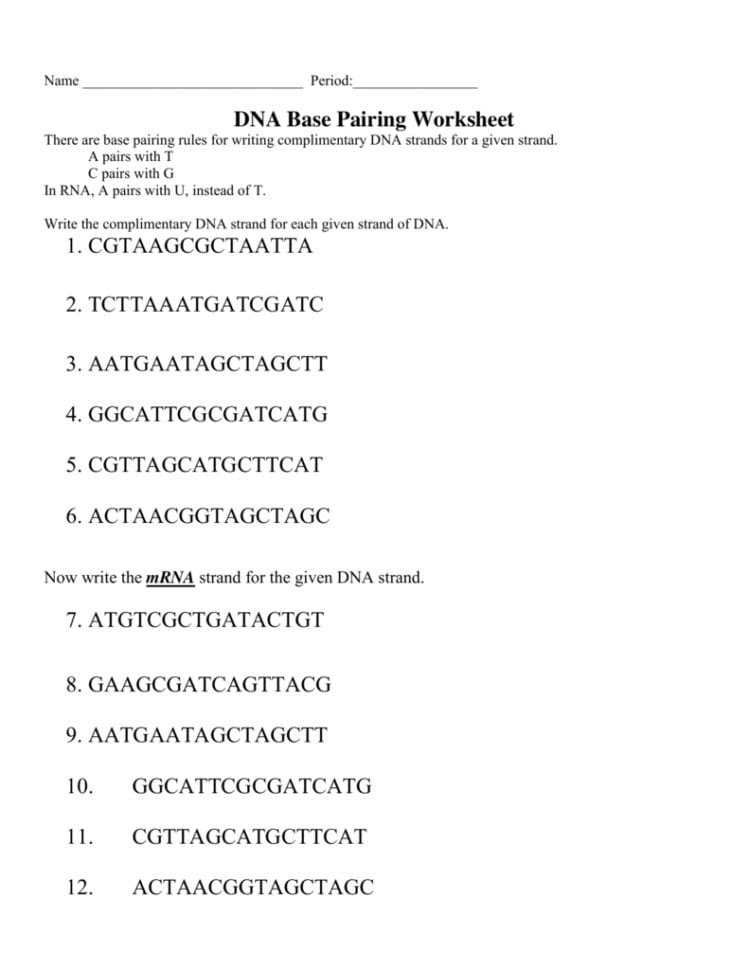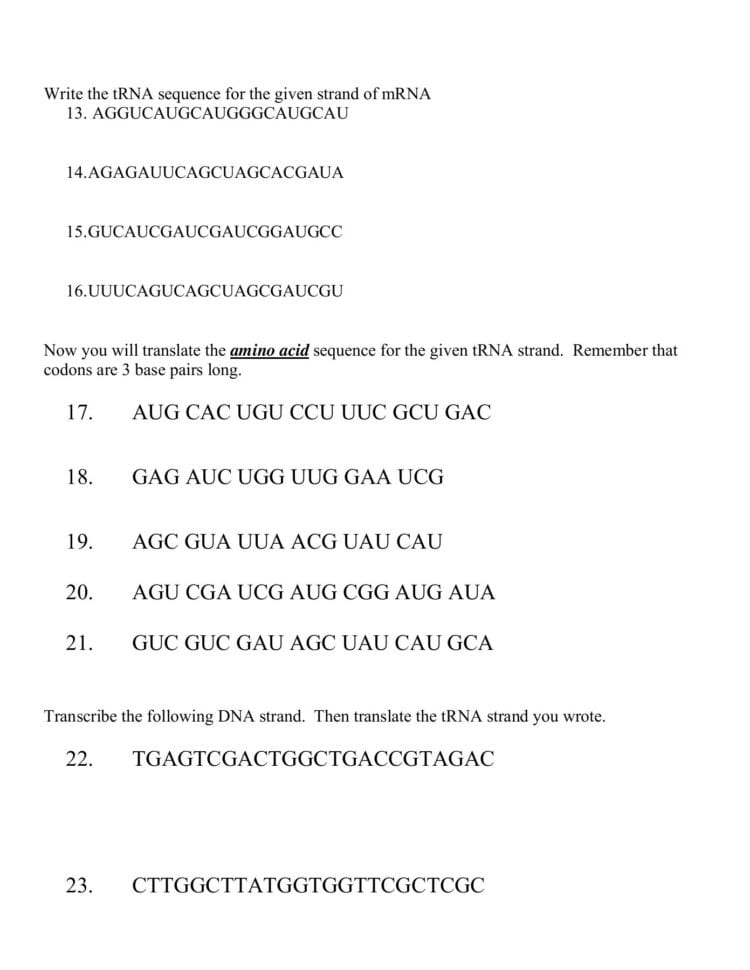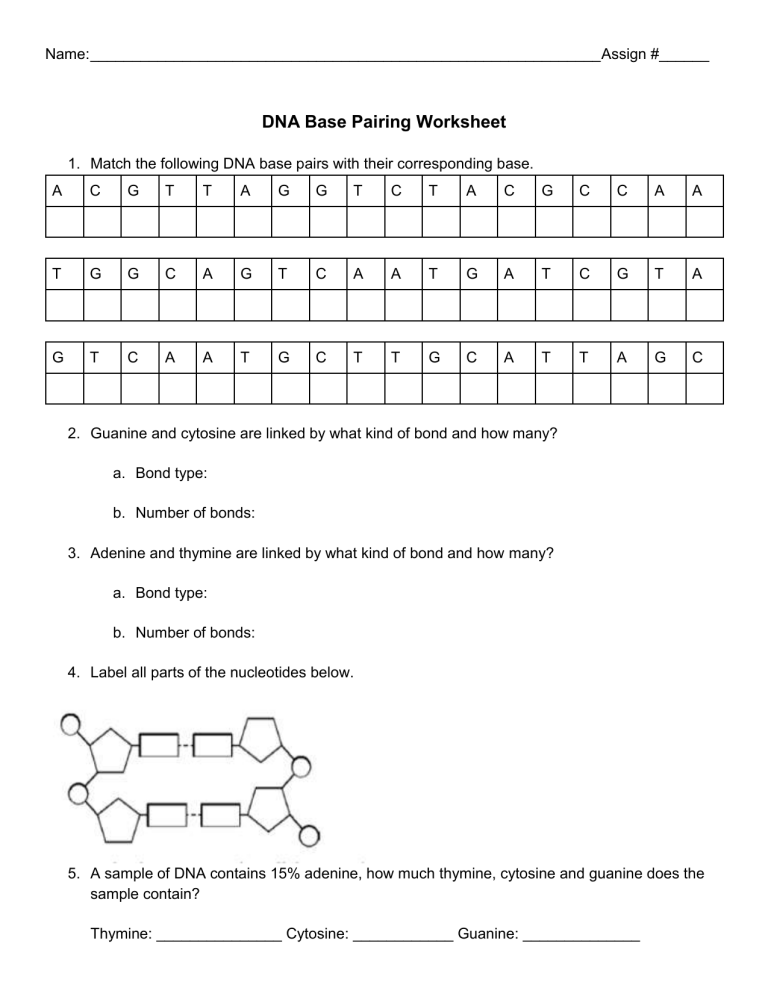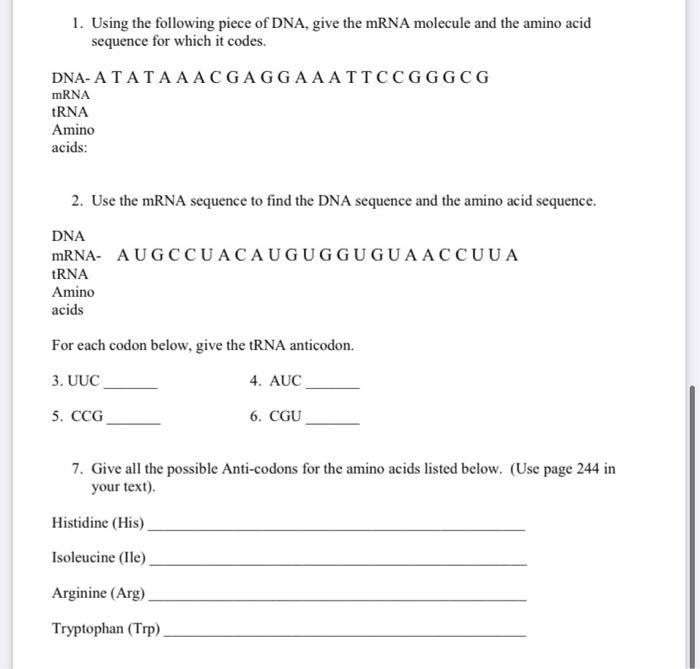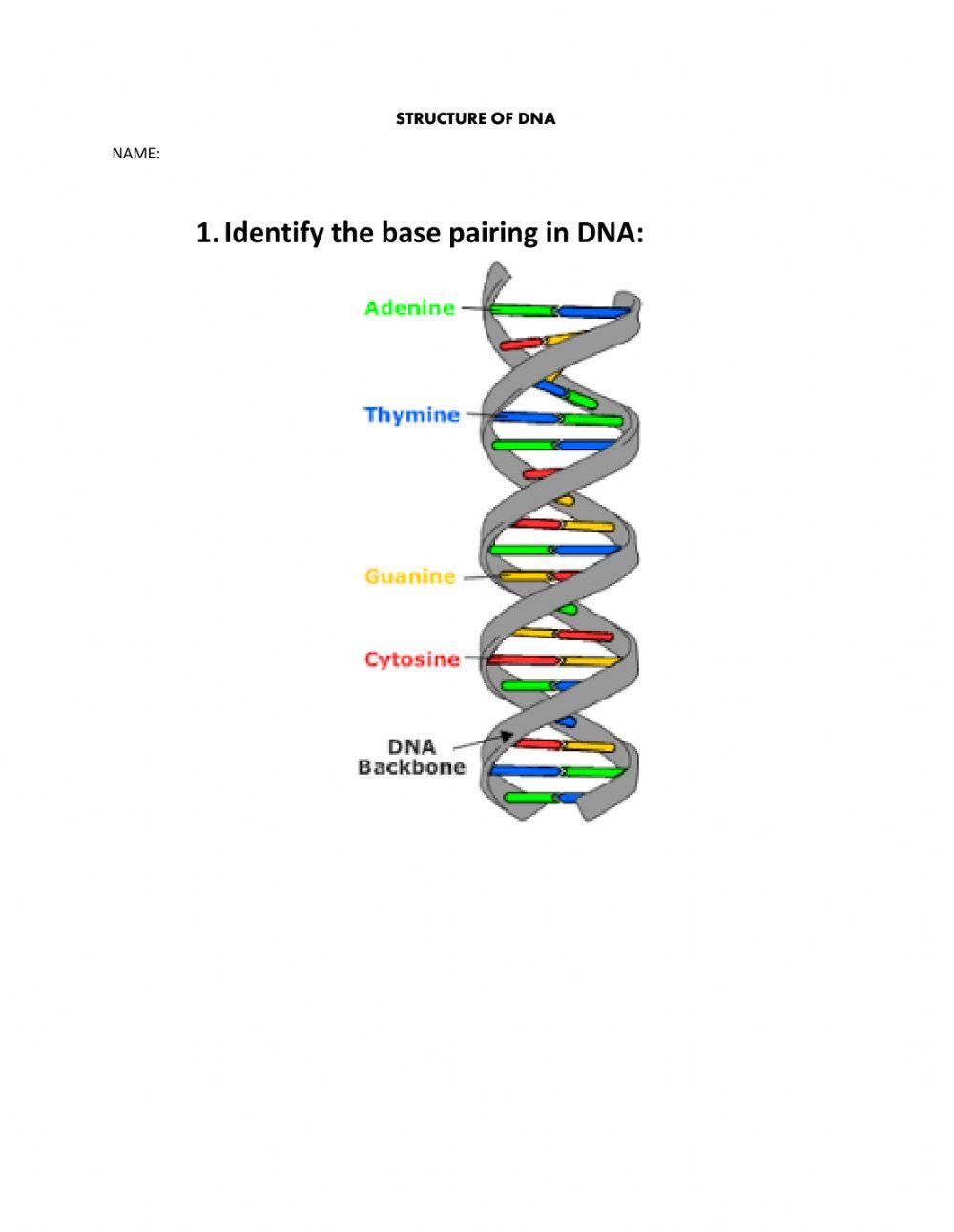Dna Base Pairing Worksheet Answer Sheet - One of the strands comes from the original strand. A pairs with t c. Fill in the appropriate bases on the dna and rna. The following dna sequence is undergoing transcription. List the 3 basic steps of dna replication: When creating new cells, each cell needs dna. • dna polymerase (the enzyme which builds dna) will only attach bases which match with the original strand of dna. Biologists, accordingly, often write dna sequences with a top strand, in a 5’ to 3’ direction (left to right) and a bottom strand in 3’ to 5’. Complete the table below showing the sequences of dna, mrna codons, trna anticodons and the amino acids. Dna base pairing worksheet there are base pairing rules for writing complimentary dna strands for a given strand.
Fill in the appropriate bases on the dna and rna. Complete the table below showing the sequences of dna, mrna codons, trna anticodons and the amino acids. When creating new cells, each cell needs dna. A pairs with t c. One of the strands comes from the original strand. • dna polymerase (the enzyme which builds dna) will only attach bases which match with the original strand of dna. The following dna sequence is undergoing transcription. Dna base pairing worksheet there are base pairing rules for writing complimentary dna strands for a given strand. List the 3 basic steps of dna replication: Fill in the appropriate bases on.
Complete the table below showing the sequences of dna, mrna codons, trna anticodons and the amino acids. Fill in the appropriate bases on. Biologists, accordingly, often write dna sequences with a top strand, in a 5’ to 3’ direction (left to right) and a bottom strand in 3’ to 5’. The following dna sequence is undergoing transcription. One of the strands comes from the original strand. Dna base pairing worksheet there are base pairing rules for writing complimentary dna strands for a given strand. • dna polymerase (the enzyme which builds dna) will only attach bases which match with the original strand of dna. When creating new cells, each cell needs dna. A pairs with t c. List the 3 basic steps of dna replication:
Dna Base Pairing Worksheet Answers Englishworksheet.my.id
When creating new cells, each cell needs dna. Biologists, accordingly, often write dna sequences with a top strand, in a 5’ to 3’ direction (left to right) and a bottom strand in 3’ to 5’. The following dna sequence is undergoing transcription. Dna base pairing worksheet there are base pairing rules for writing complimentary dna strands for a given strand..
Dna Pairing Worksheet 48 Dna Structure And Replication Works
One of the strands comes from the original strand. The following dna sequence is undergoing transcription. Fill in the appropriate bases on. List the 3 basic steps of dna replication: Fill in the appropriate bases on the dna and rna.
Dna Base Pairing Worksheet Answer Sheet —
Complete the table below showing the sequences of dna, mrna codons, trna anticodons and the amino acids. Dna base pairing worksheet there are base pairing rules for writing complimentary dna strands for a given strand. List the 3 basic steps of dna replication: Fill in the appropriate bases on. Biologists, accordingly, often write dna sequences with a top strand, in.
Dna Base Pairing Worksheet Answer Sheet —
Fill in the appropriate bases on. A pairs with t c. Fill in the appropriate bases on the dna and rna. • dna polymerase (the enzyme which builds dna) will only attach bases which match with the original strand of dna. Dna base pairing worksheet there are base pairing rules for writing complimentary dna strands for a given strand.
DNA Base Pairing Worksheet
Fill in the appropriate bases on. Complete the table below showing the sequences of dna, mrna codons, trna anticodons and the amino acids. Biologists, accordingly, often write dna sequences with a top strand, in a 5’ to 3’ direction (left to right) and a bottom strand in 3’ to 5’. Fill in the appropriate bases on the dna and rna..
(Solved) 1 Of 4 DNA Base Pairing Worksheet There He Performley DNA
The following dna sequence is undergoing transcription. List the 3 basic steps of dna replication: Fill in the appropriate bases on. A pairs with t c. When creating new cells, each cell needs dna.
Dna Base Pairing Worksheet Answers
A pairs with t c. Fill in the appropriate bases on. The following dna sequence is undergoing transcription. Complete the table below showing the sequences of dna, mrna codons, trna anticodons and the amino acids. Fill in the appropriate bases on the dna and rna.
Dna Base Pairing Worksheet Answers Pro Worksheet
List the 3 basic steps of dna replication: Dna base pairing worksheet there are base pairing rules for writing complimentary dna strands for a given strand. The following dna sequence is undergoing transcription. • dna polymerase (the enzyme which builds dna) will only attach bases which match with the original strand of dna. A pairs with t c.
Dna Base Pairing Worksheet Answers
• dna polymerase (the enzyme which builds dna) will only attach bases which match with the original strand of dna. When creating new cells, each cell needs dna. Fill in the appropriate bases on. Fill in the appropriate bases on the dna and rna. A pairs with t c.
DNA BASE PAIRING online exercise for Live Worksheets
The following dna sequence is undergoing transcription. One of the strands comes from the original strand. A pairs with t c. Complete the table below showing the sequences of dna, mrna codons, trna anticodons and the amino acids. Fill in the appropriate bases on.
A Pairs With T C.
One of the strands comes from the original strand. The following dna sequence is undergoing transcription. List the 3 basic steps of dna replication: • dna polymerase (the enzyme which builds dna) will only attach bases which match with the original strand of dna.
Dna Base Pairing Worksheet There Are Base Pairing Rules For Writing Complimentary Dna Strands For A Given Strand.
Fill in the appropriate bases on. When creating new cells, each cell needs dna. Fill in the appropriate bases on the dna and rna. Complete the table below showing the sequences of dna, mrna codons, trna anticodons and the amino acids.
